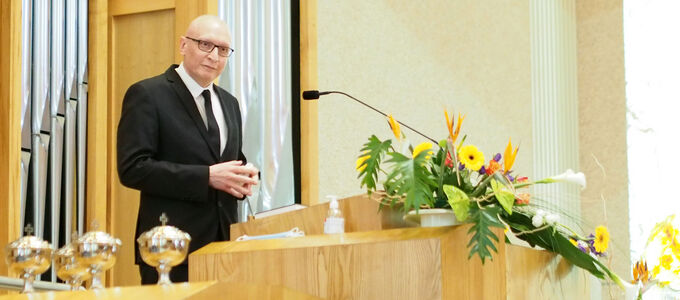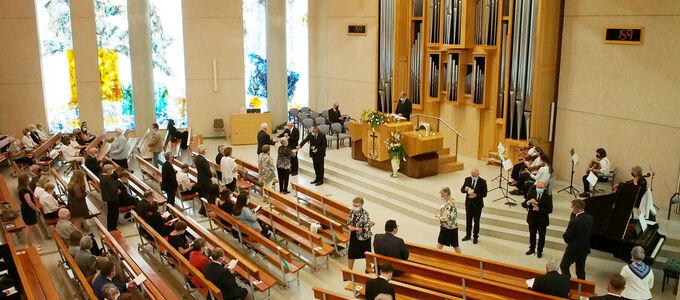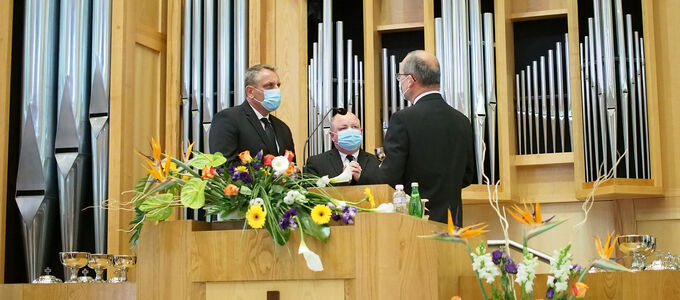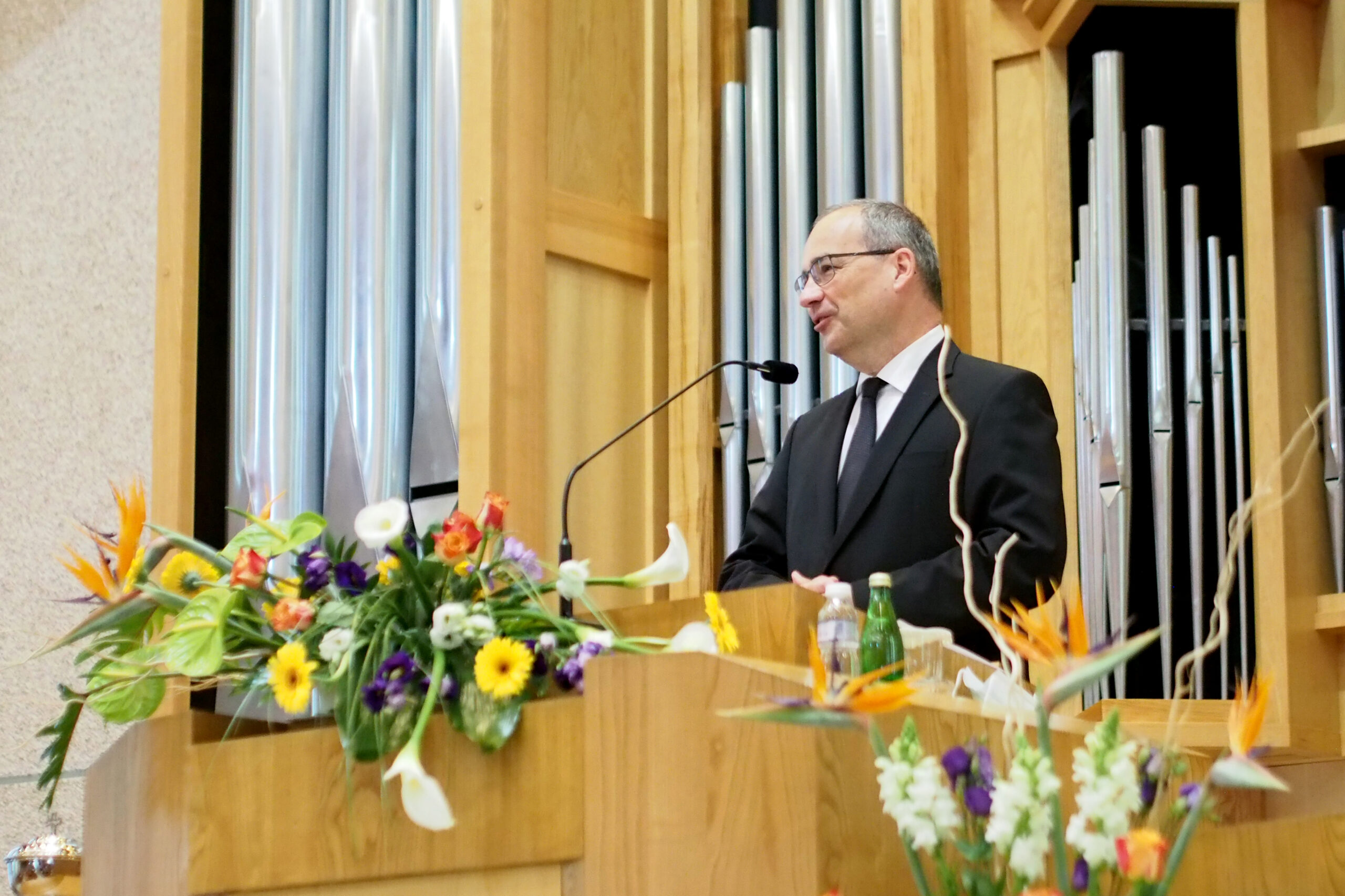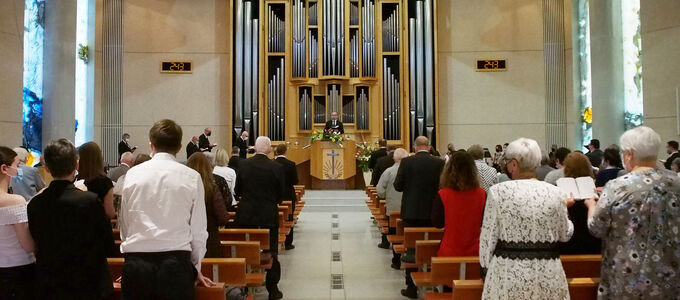
The church and the faithful are ablaze. And this fire enlightens, warms, purifies, shapes, and gathers. Yet this fire needs to be fed. Here is how from a recent sermon by the Chief Apostle.
The Bible text for the divine service on 6 June 2021 in Metz in France was short and to the point: “A fire shall always be burning on the altar; it shall never go out” (Leviticus 6: 13).
The biblical context: when the Israelites turned to God in thanksgiving or for requests, they brought offerings which were burned on the altar. The fire had to be kept burning all the time; the priests had to make sure that it never went out. In Holy Scripture, fire symbolises the presence of God: from the burning bush with Moses via the pillar of fire in the desert to the tongues of fire on Pentecost.
Chief Apostle Jean-Luc Schneider transferred these connections into our time in a twofold way: “God is at work in the church and within us,” was his central message.
Fire in the church
“God is present in His church through His Spirit,” the Chief Apostle said and went on to develop a fivefold effect.
- “The fire of the Holy Spirit enlightens us.” He reveals God’s nature through Jesus Christ, shows us the future, and enlightens us about good and evil.
- “The fire of the Holy Spirit warms.” He enables us to experience the nearness of God in divine service through His word, Holy Communion, and through fellowship.
- “In the church, the Holy Spirit purifies us through the forgiveness of sins.”
- “It is the same fire of the Holy Spirit that forms us to be tools and instruments in the hand of God.”
- “Fire brings people together. In the church, the Holy Spirit unites us with one another and makes us gather around Jesus Christ.”
This will not, however, work without certain conditions being met, he continued. First of all, if we want to benefit fully from the effectiveness of the Holy Spirit’s actions, we must come to where the fire burns. “Secondly, there must also be servants who are willing to serve so that this fire can burn,” he said. And finally: “We must not come empty-handed.” Among the spiritual sacrifices that God asks us to make are, for example, accepting our brothers and sisters as they are and not putting our own ideas above the will of God.
Fire in our soul
“Through the sacrament of Holy Sealing each of us has received the gift of the Holy Spirit, and this fire of the Holy Spirit burns in our soul,” the Chief Apostle said, adding another fivefold effect:
- “The Holy Spirit enlightens us if we listen to Him, if we give Him time to speak. He throws light on things, He shows us the dangers, and shows us the right decisions.”
- “The Holy Spirit within us warms us. When we are sad, He comforts us and lets us feel the presence of God.”
- “The Holy Spirit cleanses us. He helps us to correct ourselves.”
- “God forms us so that we can be instruments in His hand already today and can do good to those around us.”
- And He gathers: “The Holy Spirit will always favour unity, agreement, and harmony.”
“We must make sure that this fire can burn within us permanently,” the Chief Apostle pointed out, explaining what it needs to be fed with: “The more value we place on our salvation, the more we value our relationship with God, the more time we give the Holy Spirit to speak to us and influence us, and the more effective He is.”
What makes smoke pleasant
It is important that our sacrifices and offerings are not burned in a “foreign fire”. “What we bring to God must be inspired by the Holy Spirit and not by anything else.” Self-denial through sacrifice and service should not be motivated by calculation, but by gratitude and love.
“Prayer is like pleasant smoke rising to God.” Here too, the right fire must burn:
- gratitude comes from an awareness of God’s gift.
- requests for help must be motivated by our trust in God.
- pleas for forgiveness are motivated by remorse.
- intercession is nourished by love for our neighbour.
- the return of Christ is prayed for because we long for it.
The Chief Apostle concluded: “God works on our salvation in the divine services. We bring spiritual sacrifices to Him. The Holy Spirit can only work on us if we occupy ourselves with our salvation. Our prayers are pleasing to God if they are inspired by His Spirit.”









